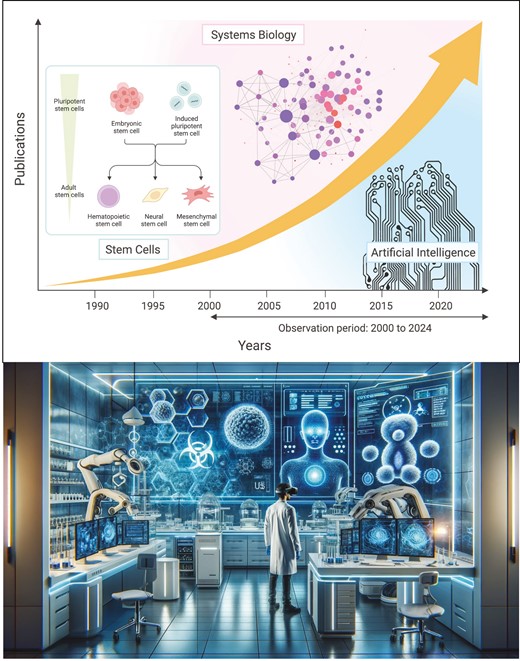The global evolution and impact of systems biology and artificial intelligence in stem cell research and therapeutics development: a scoping review.
Advanced bioinformatics analysis, such as systems biology (SysBio) and artificial intelligence (AI) approaches, including machine learning (ML) and deep learning (DL), is increasingly present in stem cell (SC) research. An approximate timeline on these developments and their global impact is still lacking. We conducted a scoping review on the contribution of SysBio and AI analysis to SC research and therapy development based on literature published in PubMed between 2000 and 2024. We identified an 8 to 10-fold increase in research output related to all 3 search terms between 2000 and 2021, with a 10-fold increase in AI-related production since 2010. Use of SysBio and AI still predominates in preclinical basic research with increasing use in clinically oriented translational medicine since 2010. SysBio- and AI-related research was found all over the globe, with SysBio output led by the (US, n = 1487), (UK, n = 1094), Germany (n = 355), The Netherlands (n = 339), Russia (n = 215), and France (n = 149), while for AI-related research the US (n = 853) and UK (n = 258) take a strong lead, followed by Switzerland (n = 69), The Netherlands (n = 37), and Germany (n = 19). The US and UK are most active in SCs publications related to AI/ML and AI/DL. The prominent use of SysBio in ESC research was recently overtaken by prominent use of AI in iPSC and MSC research. This study reveals the global evolution and growing intersection among AI, SysBio, and SC research over the past 2 decades, with substantial growth in all 3 fields and exponential increases in AI-related research in the past decade.
Authors
Silva-Sousa T, Usuda JN, Al-Arawe N, Frias F, Hinterseher I
External link
Publication Year
Publication Journal
Associeted Project
Systems Immunology of Human Diseases
Lista de serviços
-
Gene regulatory and signaling networks exhibit distinct topological distributions of motifs.Gene regulatory and signaling networks exhibit distinct topological distributions of motifs.
-
Gene signatures of autopsy lungs from obese patients with COVID-19.Gene signatures of autopsy lungs from obese patients with COVID-19.
-
Network Medicine: Methods and ApplicationsNetwork Medicine: Methods and Applications
-
ACE2 Expression Is Increased in the Lungs of Patients With Comorbidities Associated With Severe COVID-19.ACE2 Expression Is Increased in the Lungs of Patients With Comorbidities Associated With Severe COVID-19.
-
Drug repositioning for psychiatric and neurological disorders through a network medicine approach.Drug repositioning for psychiatric and neurological disorders through a network medicine approach.
-
Linking proteomic alterations in schizophrenia hippocampus to NMDAr hypofunction in human neurons and oligodendrocytes.Linking proteomic alterations in schizophrenia hippocampus to NMDAr hypofunction in human neurons and oligodendrocytes.
-
In-depth analysis of laboratory parameters reveals the interplay between sex, age, and systemic inflammation in individuals with COVID-19.In-depth analysis of laboratory parameters reveals the interplay between sex, age, and systemic inflammation in individuals with COVID-19.
-
The evolution of knowledge on genes associated with human diseasesThe evolution of knowledge on genes associated with human diseases
-
Network vaccinology.Network vaccinology.
-
Pyruvate kinase M2 mediates IL-17 signaling in keratinocytes driving psoriatic skin inflammationPyruvate kinase M2 mediates IL-17 signaling in keratinocytes driving psoriatic skin inflammation
-
Transcriptome analysis of six tissues obtained post-mortem from sepsis patientsTranscriptome analysis of six tissues obtained post-mortem from sepsis patients
-
Gene Signatures of Symptomatic and Asymptomatic Clinical-Immunological Profiles of Human Infection by Leishmania (L.) chagasi in Amazonian BrazilGene Signatures of Symptomatic and Asymptomatic Clinical-Immunological Profiles of Human Infection by Leishmania (L.) chagasi in Amazonian Brazil
-
In vitro morphological profiling of T cells predicts clinical response to natalizumab therapy in patients with multiple sclerosis.In vitro morphological profiling of T cells predicts clinical response to natalizumab therapy in patients with multiple sclerosis.
-
Integrative immunology identified interferome signatures in uveitis and systemic disease-associated uveitis.Integrative immunology identified interferome signatures in uveitis and systemic disease-associated uveitis.
-
Gene regulatory networks analysis for the discovery of prognostic genes in gliomas.Gene regulatory networks analysis for the discovery of prognostic genes in gliomas.
-
Revealing shared molecular drivers of brain metastases from distinct primary tumors.Revealing shared molecular drivers of brain metastases from distinct primary tumors.

